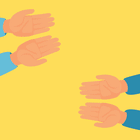The lost art of paying attention
Silence may not cure my habit of mis-hearing lyrics, but it'll help me hear the right things
I’m bad at hearing lyrics. Let’s just get that out of the way.
For years I sang a line by the Strokes like a mantra, with dreams of living and working in the big city. “New York City calls,” I’d mutter or sing under my breath as I imagined a certain type of future.
But that’s not they lyric. At all.
Turns out the song’s actually a political anthem. About police violence. Not artistic calling. New York City cops.
Oh.
There's a term for this lyrical mishap: Mondogreen, when “you hear the same acoustic information as everyone else, but your brain doesn’t interpret it the same way.”1 There’s host of other reasons we mishear: Oronyms, the McGurk effect.
I think another reason we mis-hear is that we simply don’t pay close attention.
My nephew Spencer doesn’t mondogreen. He knows every word of every line to the musical Hamilton, for example, and can rattle the words of “My Shot” off like an understudy.
Spencer did the work. He paid attention. He can recite the whole musical.
I, on the other hand cannot.2 I’m usually only aware I’ve got the lyric wrong when I’m belting out a tune only to stop mid-lyric when I notice a friend or family member’s smirk or look of surprise.
The lost art of paying attention
Do you ever feel like we’re in a noisy era?
Lots of words, songs and opinions in the air. But what do people mean? The term “misinformation” is used so frequently, it almost means nothing. And people, especially in media, uses it as a strategy to discount others, especially opposing views.
Not hearing and not listening are real things.
Choosing to not listen goes hand-in-hand with our habit of scrolling and headlining—reading the story links and article titles that summarize news (and are used as clickbait by media publishers) but not the content itself. We don’t pause long enough to check, especially if the headline already confirms what we’ve decided.
We do this with politics and news. And it’s easy to do it in almost every other area of life.
Check your inbox. How can you possibly be on top of all the communication? Spend three minutes on your social media app of choice. You’re bombarded with info!
I can’t know every lyric of every song. I can’t take in every meaning in this world of many meanings. So I must be selective, zone in, and curate what I take in to my mind and heart.
Dallas Willard highlights the significance of the things we write down and the things we say, reminding us that, “Through words, soul impacts soul, sometimes with a great spiritual force. As marks or sounds alone, words are nothing. It is their mental side, their spiritual force, that hooks into the hidden levers of mind and reality and gives them their immense power.”3
Who I listen to—and what attention I give those words—matters.
Science tells us that music activates just about all of the brain. Not just brain zones that involve emotion. Music also activates regions of memory, the motor system, and because it activates almost all brain regions, it can help keep the myriad of neural networks strong.
And the words we take in have great power to shape us and our understanding. Strengthen us too.
Silence as a start point for listening with attention
Catherine de Hueck Doherty, who defected to the West after the Communist revolution in Russia in 1917 and a forerunner of the civil rights movement in the US through her care for the poor, highlighted the importance of silence to hone our ability to pay attention (and to pay attention to the right things).
If we are to witness to Christ in today’s market places, where there are constant demands on our whole person, we need silence. If we are to be always available, not only physically, but by empathy, sympathy, friendship, understanding and boundless caritas, we need silence. To be able to give joyous, unflagging hospitality, not only of house and food, but of mind, heart, body and soul, we need silence.4
Over the last few weeks I've unwittingly mapped my way for listening and paying attention. The tactics I rely on include walking and being in nature, relying on the wisdom of the past through ancient friendships, and putting down devices to look with wonder of the world.
When I’m not belting out the wrong lyrics to songs that emotionally resonate with me, I’ll use the silence to pay attention.
Hitting the like button may not make a sound, but it will send shockwaves throughout the world of my thankfulness, just like a butterflies wing-flap dramatically changes weather patterns a continent away.
Here’s a wonderful article in the New Yorker about why we mishear.
An aside: I listen to music based on the feeling of a song, co-opt its emotional or spiritual meaning (to me), and use it for my own purposes, with not much attention to the words. (Sorry lyricists).
Hearing God. Dallas Willard. Intervarsity Press: Madison, WI. 1999. If you’re looking for a great read about navigating the world of screens, check this book out out. And here’s where I note that I’m testing out Amazon affiliate links. Purchases of the book and other Amazon-linked products here may generate a small commission to TIWD.
From an excerpt of Joyce Hugget’s helpful book Listening to God.






To be a good listener one needs to listen with the heart as well as the ears. One’s heart can hear what may not be spoken.